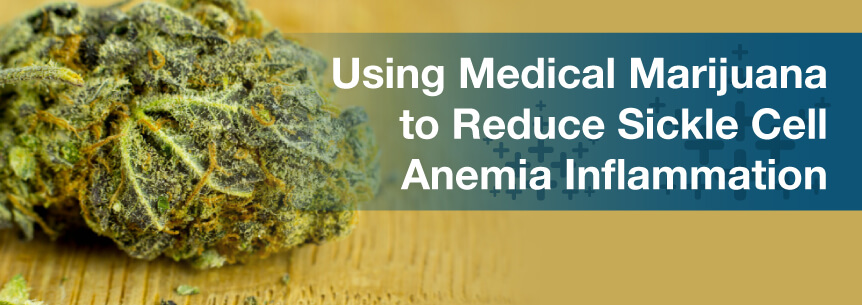
Much attention is given to the irregularly shaped red blood cells associated with the inherited disorder sickle cell anemia. Because of their sticky consistency and crescent shape, these misshapen blood cells interfere with proper circulatory function and inhibit oxygen flow through the body’s blood vessels.
However, a common side effect of sickle cell anemia that receives less attention is inflammation. Most treatments deal with the pain associated with the condition or attempt to assist blood flow and prevent a sickle cell crisis when sickle-shaped blood cells block small blood vessels causing sudden and severe pain. But, these treatments don’t necessarily focus on the inflammation caused by the disease.
Many sickle cell anemia patients are using medical marijuana to treat the chronic pain associated with the condition. However, the anti-inflammatory properties of cannabis could offer additional benefits to these patients. Not only does medical marijuana reduce pain caused by inflammation, but it could also prevent further complications from developing by keeping the body’s inflammatory response in check.
Inflammation is not supposed to be harmful. In fact, it’s a natural immune system response to injury, viruses or bacteria. Inflammation removes damaging outside stimuli and allows the body to heal. Most of the time, it’s necessary.
However, sometimes the inflammatory response is unneeded. In these instances, the body can actually cause damage to its own tissue. Autoimmune disorders, arthritis and digestive issues like inflammatory bowel disease are examples of how inflammation can damage different body parts — from joints to the digestive system. Sickle cell anemia can also cause inflammation to occur.
One of the side effects of sickle cell anemia is chronic inflammation. But what causes this? As deformed red blood cells become rigid and obstruct blood flow, this can cause damage to tissue that’s not receiving enough blood. The irregular shape of these red blood cells provokes an inflammatory response. On top of that, the damaged tissue becomes exposed to cytokines, small proteins known to cause inflammation.
This inflammation, in conjunction with other factors, can cause patients to develop serious complications, such as:
When looking at the healing properties of marijuana, it all comes down to its interaction with our body’s endocannabinoid system (ECS), which is comprised of receptors present in every major bodily system. The cannabinoids in cannabis, specifically THC and CBD, have a strong effect on these receptors. This allows the plant to provide its many beneficial effects.
One such effect is marijuana’s anti-inflammatory properties. The plant treats inflammation by:
On top of all that, medical marijuana treats the pain associated with inflammation, allowing patients to feel relief from this symptom.
Although we present this information to aid patients searching for more information about the potential of medical marijuana treatments, our advice should not replace that of a medical professional.
If you feel you would benefit from compassionate cannabis treatments, then the first step is to make an appointment with marijuana doctor near you. They can assess your condition and determine if you qualify for your state’s program. Don’t let sickle cell anemia rob you of a happier, more comfortable lifestyle. Find a doctor near you today.